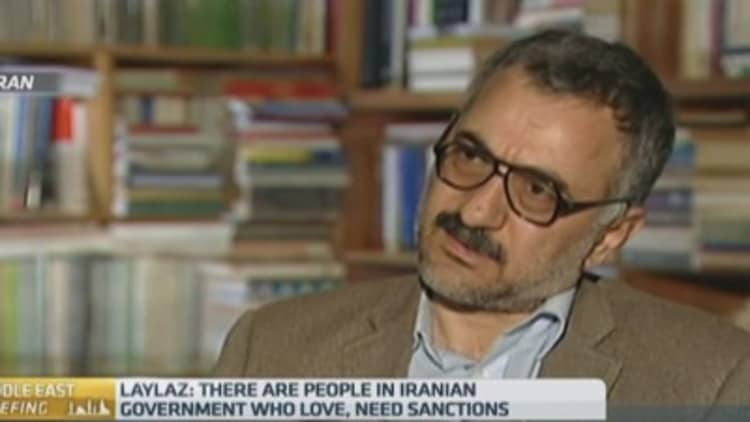Iran's president may sincerely want to liberalize his country's economy, but that's unlikely to happen—for now, anyway.
In a Sunday speech to economists, Iranian President Hassan Rouhani advocated more integration with the global economy, saying that Iran can't grow "while we are isolated" and must try reach a deal on its contested nuclear program. Iran has until June to hammer out an agreement that it hopes will lift sanctions on the country.
Rouhani also called for economic reforms that would increase competition and transparency, curb corruption and expand taxation to certain groups aligned with the government. He also said he would like to see major economic, social, political and cultural issues "put to public referendum rather than parliamentary vote."
Read MoreSome Iranians actually gain from sanctions, economist says
"Our economy will not prosper as long as it is monopolized (by the government). The economy must be rid of monopoly and see competition," he said.
Rouhani did not explicitly call for a public vote on the country's nuclear program, but some Iran watchers took his comments as a sign that he supports that option.

But the powers that be in Iran are very unlikely to allow a referendum on such a sensitive issue, said Karim Sadjadpour, senior associate of the Middle East program at the Carnegie Endowment for International Peace.
"It would open up a Pandora's box. Soon Iranians would want a referendum on whether they need a supreme leader, whether the hijab (headscarves) should be mandatory, whether they should continue spending billions of dollars on Hezbollah and [Syrian President] Bashar Assad," he said.
Any referendum—on Iran's nuclear program or any other issue—would not only need Supreme Leader Ayatollah Ali Khamenei's blessing, but support from two-thirds of Iranian parliament, which is stacked with conservatives who are unlikely to side with Rouhani.
Read MoreOil falls below $49 as sector faces 'Hunger Games'
Rouhani's mention of a public referendum may have been more of a strategic move than a serious proposal, said Cliff Kupchan, chairman of the Eurasia Group.
"He's clearly trying to tell [Khamenei] an agreement is popular, and you should support it," he said.
If Iran reaches a nuclear agreement with the so-called P5+1 nations on the other side of the negotiations—the United States, United Kingdom, France, Russia, China and Germany—then Iranian conservatives could be vulnerable, because they have made a livelihood of opposing a nuclear deal, Kupchan said.
Will next elections hurt conservatives?
It's too soon to determine conservatives' prospects for elections in parliament next year, but they have lately failed to achieve unity, he added.
"Right now they look poised to replay a bad movie we've already seen," said Kupchan. "They did not unite behind one person in the presidential election, and they lost badly."
If Rouhani's allies can use the 2016 parliamentary elections to get supportive lawmakers elected, they can put him in a winning position for the next presidential election and buy him time to implement economic reform, said Djavad Salehi-Isfahani, an Iranian professor of economics at Virginia Tech.
Read MoreUS and Iran could have a friendlier future ahead
While some Iranians have grown disappointed with Rouhani in the absence of progress on his campaign promises, they remain in favor of rapprochement with the outside world, he said.
"I see Rouhani's emergence as a middle-class movement for global cooperation and a better life for the average Iranian," he said. "It is very much in tune with working with America, working with Europe."
At first glance, expanding trade may appear at odds with Iran's so-called resistance economy, a 12-point stratagem laid out by Ayatollah Khamenei that has sought to reduce the effects of sanctions by making the country more self-reliant.
But many of those principles are not inconsistent with globalization, Salehi-Isfahani said. What's more, the concept of the resistance economy is fairly vague, so Khamenei could support greater openness without being seen to have compromised his values, he added.


